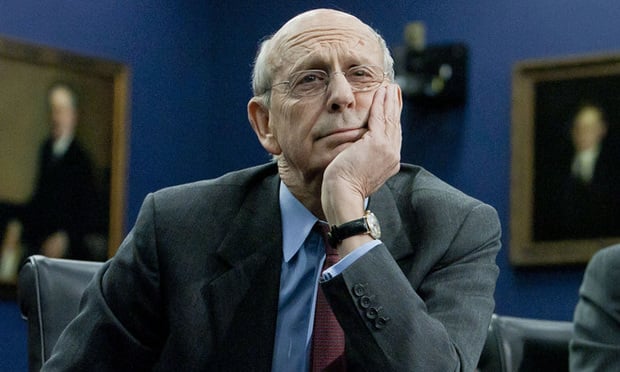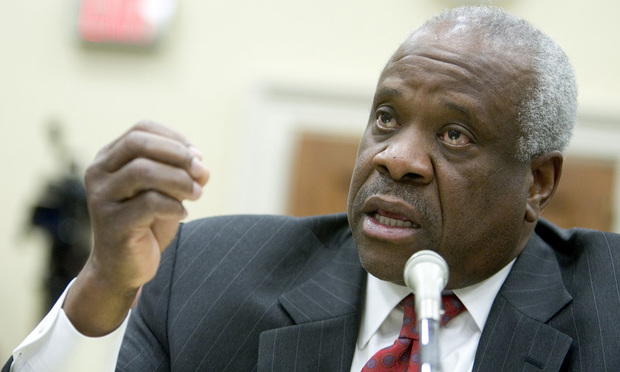Justice Breyer Denounces Ruling That Strikes Precedent in California Case, Questions Which Cases Are Next
Breyer accused his colleagues of encouraging lawyers to challenge settled law. His dissent came in a case Monday that struck down 40-year-old precedent that the Constitution does not prohibit suits brought by an individual against a state in the courts of another state.
May 13, 2019 at 12:11 PM
4 minute read
The original version of this story was published on National Law Journal
 Justice Stephen Breyer testifying in 2015. Photo: Diego M. Radzinschi/NLJ
Justice Stephen Breyer testifying in 2015. Photo: Diego M. Radzinschi/NLJU.S. Supreme Court Justice Stephen Breyer on Monday warned that his colleagues may be poised to overturn court precedents in upcoming cases in ways that will sow “increased uncertainty” about the court's consistency.
Joined by liberal colleagues Ruth Bader Ginsburg, Sonia Sotomayor and Elena Kagan, Breyer dissented in Franchise Tax Board of California v. Hyatt, a state sovereignty case in which the 5-4 majority explicitly overturned a 40-year-old precedent, Nevada v. Hall.
The California case is one of at least four in which the court is being asked to overturn precedents this term.
“Each time the court overrules a case, the court produces increased uncertainty,” Breyer wrote. “To overrule a sound decision like Hall is to encourage litigants to seek to overrule other cases; it is to make it more difficult for lawyers to refrain from challenging settled law; and it is to cause the public to become increasingly uncertain about which cases the court will overrule and which cases are here to stay.”
Breyer added, “Today's decision can only cause one to wonder which cases the court will overrule next.” Other pending cases that challenge precedents include Gamble v. United States, a double jeopardy dispute; Knick v. Township of Scott, a takings case; and Kisor v. Wilkie, a regulatory deference case.
Justice Clarence Thomas, who has displayed more willingness to overturn precedent than any other member of the court, wrote the majority opinion, joined by Chief Justice John Roberts Jr. and justices Samuel Alito Jr., Neil Gorsuch and Brett Kavanaugh.
In a two-page defense of overturning precedents in his majority opinion, Thomas asserted that stare decisis, the doctrine that favors preserving precedents, is “not an inexorable command.” The Hall case, Thomas wrote, “stands as an outlier in our sovereign immunity jurisprudence, particularly when compared to more recent decisions.” He added, “Nevada v. Hall is irreconcilable with our constitutional structure.”
 Justice Clarence Thomas (2015). Photo: Diego M. Radzinschi/ALM
Justice Clarence Thomas (2015). Photo: Diego M. Radzinschi/ALMAt issue in the case, which has been before the court three times, is whether states are immune from being sued in the courts of another state. By a 5-4 vote, the 1979 Nevada precedent ruled that the Constitution does not prohibit suits brought by an individual against a state in the courts of another state.
Kate Shaw, professor at Yeshiva University Benjamin N. Cardozo School of Law, said of the decision Monday, “Justice Thomas has very little use for stare decisis; more surprising is that none of the other members of the majority—in particular the Chief Justice—wrote separately on this point. In light of that, I think the ominous tone Justice Breyer strikes at the end of his dissent is quite justified.”
At a Heritage Foundation and Bradley Foundation panel discussion last week, Kirkland & Ellis partner Paul Clement, a former U.S. solicitor general, said of the pending challenges targeting precedents, “I think which one they decide to overrule and why that one and not the others and what the various justices say about that I think will be profoundly important in terms of measuring the trajectory of the court going forward.”
The court's ruling in Franchise Tax Board of California v. Hyatt is posted below:
Read more:
Justice Kavanaugh Raises Questions About Overruling Precedent
Clarence Thomas Stirs Up a First Amendment Squabble Over Libel Law
Dozens of Class Actions Build on Supreme Court's 'Janus' Union Ruling
This content has been archived. It is available through our partners, LexisNexis® and Bloomberg Law.
To view this content, please continue to their sites.
Not a Lexis Subscriber?
Subscribe Now
Not a Bloomberg Law Subscriber?
Subscribe Now
NOT FOR REPRINT
© 2025 ALM Global, LLC, All Rights Reserved. Request academic re-use from www.copyright.com. All other uses, submit a request to asset-and-logo-licensing@alm.com. For more information visit Asset & Logo Licensing.
You Might Like
View All



DOJ, 10 State AGs File Amended Antitrust Complaint Against RealPage and Big Landlords
4 minute readTrending Stories
Who Got The Work
Michael G. Bongiorno, Andrew Scott Dulberg and Elizabeth E. Driscoll from Wilmer Cutler Pickering Hale and Dorr have stepped in to represent Symbotic Inc., an A.I.-enabled technology platform that focuses on increasing supply chain efficiency, and other defendants in a pending shareholder derivative lawsuit. The case, filed Oct. 2 in Massachusetts District Court by the Brown Law Firm on behalf of Stephen Austen, accuses certain officers and directors of misleading investors in regard to Symbotic's potential for margin growth by failing to disclose that the company was not equipped to timely deploy its systems or manage expenses through project delays. The case, assigned to U.S. District Judge Nathaniel M. Gorton, is 1:24-cv-12522, Austen v. Cohen et al.
Who Got The Work
Edmund Polubinski and Marie Killmond of Davis Polk & Wardwell have entered appearances for data platform software development company MongoDB and other defendants in a pending shareholder derivative lawsuit. The action, filed Oct. 7 in New York Southern District Court by the Brown Law Firm, accuses the company's directors and/or officers of falsely expressing confidence in the company’s restructuring of its sales incentive plan and downplaying the severity of decreases in its upfront commitments. The case is 1:24-cv-07594, Roy v. Ittycheria et al.
Who Got The Work
Amy O. Bruchs and Kurt F. Ellison of Michael Best & Friedrich have entered appearances for Epic Systems Corp. in a pending employment discrimination lawsuit. The suit was filed Sept. 7 in Wisconsin Western District Court by Levine Eisberner LLC and Siri & Glimstad on behalf of a project manager who claims that he was wrongfully terminated after applying for a religious exemption to the defendant's COVID-19 vaccine mandate. The case, assigned to U.S. Magistrate Judge Anita Marie Boor, is 3:24-cv-00630, Secker, Nathan v. Epic Systems Corporation.
Who Got The Work
David X. Sullivan, Thomas J. Finn and Gregory A. Hall from McCarter & English have entered appearances for Sunrun Installation Services in a pending civil rights lawsuit. The complaint was filed Sept. 4 in Connecticut District Court by attorney Robert M. Berke on behalf of former employee George Edward Steins, who was arrested and charged with employing an unregistered home improvement salesperson. The complaint alleges that had Sunrun informed the Connecticut Department of Consumer Protection that the plaintiff's employment had ended in 2017 and that he no longer held Sunrun's home improvement contractor license, he would not have been hit with charges, which were dismissed in May 2024. The case, assigned to U.S. District Judge Jeffrey A. Meyer, is 3:24-cv-01423, Steins v. Sunrun, Inc. et al.
Who Got The Work
Greenberg Traurig shareholder Joshua L. Raskin has entered an appearance for boohoo.com UK Ltd. in a pending patent infringement lawsuit. The suit, filed Sept. 3 in Texas Eastern District Court by Rozier Hardt McDonough on behalf of Alto Dynamics, asserts five patents related to an online shopping platform. The case, assigned to U.S. District Judge Rodney Gilstrap, is 2:24-cv-00719, Alto Dynamics, LLC v. boohoo.com UK Limited.
Featured Firms
Law Offices of Gary Martin Hays & Associates, P.C.
(470) 294-1674
Law Offices of Mark E. Salomone
(857) 444-6468
Smith & Hassler
(713) 739-1250






